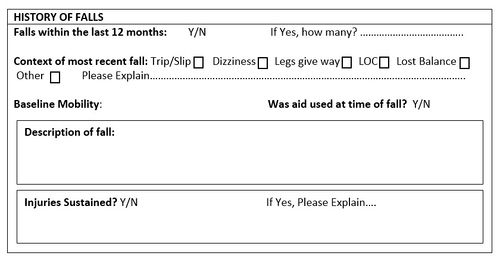Dementia Fall Risk Can Be Fun For Anyone
Table of ContentsThe Ultimate Guide To Dementia Fall RiskThe Basic Principles Of Dementia Fall Risk The Ultimate Guide To Dementia Fall RiskGetting My Dementia Fall Risk To WorkNot known Details About Dementia Fall Risk
Analyzing loss risk aids the entire health care team establish a much safer atmosphere for every person. Guarantee that there is an assigned area in your clinical charting system where personnel can document/reference scores and record pertinent notes connected to drop avoidance. The Johns Hopkins Loss Threat Analysis Device is among many tools your staff can make use of to aid protect against damaging medical events.Patient drops in hospitals prevail and devastating negative events that persist in spite of decades of initiative to reduce them. Improving communication throughout the examining nurse, care team, person, and person's most included family and friends might enhance autumn prevention initiatives. A team at Brigham and Female's Health center in Boston, Massachusetts, sought to develop a standardized fall avoidance program that centered around enhanced communication and individual and family interaction.

The technology group stressed that effective application depends upon client and personnel buy-in, integration of the program right into existing process, and integrity to program procedures. The group kept in mind that they are coming to grips with exactly how to guarantee connection in program execution throughout durations of dilemma. During the COVID-19 pandemic, for example, an increase in inpatient drops was related to limitations in patient involvement in addition to constraints on visitation.
The Ultimate Guide To Dementia Fall Risk
These incidents are commonly considered preventable. To execute the treatment, organizations need the following: Access to Loss pointers sources Loss suggestions training and re-training for nursing and non-nursing personnel, including brand-new nurses Nursing process that permit client and family members involvement to carry out the drops assessment, make sure use the avoidance plan, and carry out patient-level audits.
The outcomes can be very destructive, commonly speeding up patient decrease and causing longer health center stays. One research study estimated remains raised an additional 12 in-patient days after a client loss. The Loss TIPS Program is based on engaging individuals and their family/loved ones across three major procedures: assessment, customized preventative interventions, and bookkeeping to make certain that patients are participated in the three-step autumn avoidance procedure.
The patient evaluation is based upon the Morse Loss Scale, which is a verified autumn risk analysis device for in-patient hospital settings. The scale consists of the 6 most usual reasons patients in healthcare facilities drop: the person fall history, high-risk conditions (including polypharmacy), use IVs and various other exterior tools, psychological standing, stride, and mobility.
Each risk element web links with one or even more workable evidence-based treatments. The registered nurse develops a strategy that incorporates the interventions and shows up to the care team, patient, and family members on a laminated poster or published aesthetic help. Nurses establish the strategy while meeting the client and the client's household.
The 30-Second Trick For Dementia Fall Risk
The poster functions as a communication device with other participants of the person's treatment group. Dementia Fall Risk. The audit component of the program includes assessing the person's understanding of their risk variables and avoidance plan at the device and healthcare facility levels. Registered nurse champions perform a minimum of five private interviews a month with article patients and their family members to examine for understanding of the autumn avoidance plan

An estimated 30% of these drops result in injuries, which can vary in intensity. Unlike other adverse occasions that need a standardized professional reaction, fall avoidance depends highly on the demands of the client.
Dementia Fall Risk - The Facts

Based on bookkeeping results, one site had 86% conformity and two sites had more than 95% compliance. A cost-benefit analysis of the Loss pointers program in 8 hospitals approximated that the program price $0.88 per individual to implement and led to financial savings of $8,500 per 1000 patient-days in direct costs connected to the prevention of 567 drops over 3 years and eight months.
According to the innovation group, organizations curious about carrying out the program should perform a readiness analysis and falls prevention gaps analysis. 8 In addition, companies ought to guarantee the necessary facilities and workflows for execution and develop an web execution plan. If one exists, the company's Fall Avoidance Job Force need to be associated with planning.
Getting The Dementia Fall Risk To Work
To begin, organizations must make certain completion of training components by registered nurses and nursing assistants - Dementia Fall Risk. Hospital team need to analyze, based upon the requirements of a health center, whether to use an electronic health and wellness document hard copy or paper variation of the loss avoidance strategy. Implementing teams need to recruit and important link train nurse champs and develop procedures for bookkeeping and coverage on loss information
Staff need to be associated with the procedure of revamping the process to involve individuals and family members in the analysis and avoidance strategy procedure. Systems should be in place so that units can recognize why an autumn took place and remediate the reason. A lot more particularly, registered nurses must have channels to supply continuous comments to both staff and unit leadership so they can readjust and enhance autumn prevention workflows and connect systemic troubles.